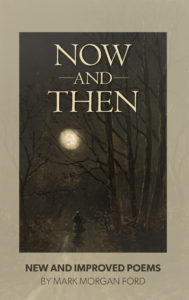
I’m doing a final revision of my fourth book of poetry…
I’m doing a final revision of my fourth book of poetry. It’s called Now and Then: New and Improved Poems.
I am happy with the title. Is it snarky? I’m not sure. Right now, I like it.
This is probably the 30th revision. For me, poetry is 90% revision. That’s literally true. I checked this last draft against the first. Only 10% of the original words remain.
Some of these poems, as the title suggests, have been published previously. Normally, one doesn’t change a previously published poem. But I did. Over and over again. What’s happened is that some of the poems I no longer recognize as mine. I don’t remember the plots. I don’t recognize the characters.
But that just makes it easier to critique them. They have come from elsewhere. They are newly formed into something apart from me. And that makes the consumption of them more satisfying.
Like the following poem… I am sure my interlocutor was once a real person. I don’t recognize her anymore, but I like the person she became.
